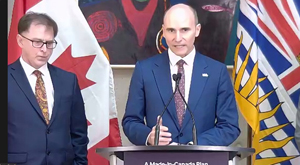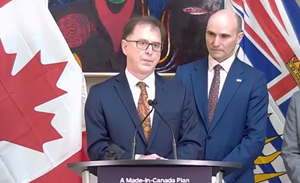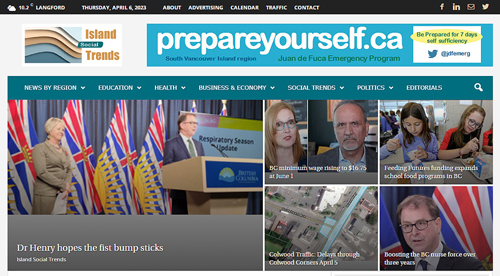
Thursday April 13, 2023 | VANCOUVER, BC
by Mary P Brooke, B.Sc. | Island Social Trends
A federal funding agreement with British Columbia has been extended for one year to cover home supports, mental health care, and the opioid crisis was announced. And it will be extended for four additional years.
That was the subject of a joint media session at Vancouver General Hospital yesterday, where BC Health Minister Adrian Dix hosted federal Health Minister Jean-Yves Duclos to highlight investments to strengthen public health care across Canada, and to announce investments to support Home and Community Care, Mental Health and Addictions Services through the BC Ministry of Health.
Duclos called it “great news” news that the investments will be done “in connection with and in addition to the investment that we are making together, flowing from the agreement that we came to with the province on March 1 (agreement in principle)”.
The investment flowing to the province of British Columbia is approximately $3 billion over the next 10 years “just through the bilateral transfers”, said Duclos, saying that’s to cover “personal and family medicine, mental health care, supporting workers, and investing in data and technology.”

Funding profile:
On February 7, 2023 the Government of Canada announced an investment of $198.6 billion over 10 years, including $46.2 billion in new funding for provinces and territories to improve health care services for Canadians. This funding includes an immediate, unconditional $2 billion Canada Health Transfer (CHT) top-up to address immediate pressures on the health care system.
On March 1 the Government of Canada and the Government of British Columbia took the next step by announcing an agreement in principle for a shared plan that will invest $27.47 billion in federal funding over 10 years in British Columbia including $3.32 billion for a new bilateral agreement focusing on the shared health care priorities and $273 million through the immediate, one-time CHT top-up to address urgent needs, especially in pediatric hospitals and emergency rooms, and long wait times for surgeries. This will further help provide British Columbians with improvements in health care that includes:
- access to high-quality family health services when they need them, including in rural and remote areas, and for underserved communities;
- a resilient and supported health workforce that provides them high-quality, effective, and safe health care services;
- access to timely, equitable, and quality mental health, substance use and addictions services; and
- access to their own electronic health information that is shared between the health professionals they consult.
Importance of data:
“It’s important that we have the right data to guide us,” the federal health minister said. “Data and guidance are essential to providing appropriate health care,” said Duclos.
“This is the result of modern technologies but also modern ways for workers to work together in a team context,” said Minister Duclos, adding that he sees that being done exceptionally well at the Vancouver General Hospital “with the leadership of the province, and most importantly with the leadership of the health professionals in the hospital.”
Youth access to mental health & addiction services:
Duclos said BC will be looking to look at the number of people that have more access to mental health and addiction services. Especially for younger Canadians.
“We know the level of stress and anxiety that young Canadians have been feeling because of COVID-19, but also other things that have been happening on our planet,” the federal health minister said. “In 2023, it’s stressful to see what’s happening on earth,” said Duclos, saying that families and individuals are concerned and have an additional level of anxiety.
“Delivering appropriate and timely addictions and mental health services is key and the province has been strong in monitoring the recent investments in those types of indicators,” said Duclos.
“For community and home care, Minister Dix alluded to that earlier, that we are able to provide direct services at the community or home care level so that people can age in safety and dignity at home or close to home,” said Duclos.
He said that indicators like the number of workers and personal service workers helps with hiring and retention, toward the delivery of ‘best quality services’ to seniors, for example. Referring to long-term care, he itemized the importance of data around rooms, safety and inspections: “The number of rooms that have been enhanced, safety protection against infections, inspections of long-term care homes that are under some standards and norms for the quality of work and quality of care.”
Reporting requirements:
“Under all these agreements we have reporting requirements,” said BC Health Minister Adrian Dix. That includes having to do with home and community care and around mental health and addiction services.
“The commitment of the Government of BC is such that it’s very easy to meet the test of the agreement. We’ve seen a significant increase in home support hours in BC since this agreement came into place. We’ve seen a dramatic increase in community-based services — 28% in those hours which are community-based public health visits largely to people’s homes,” said Dix.
He noted an increased in beds and services provided around mental health and addictions.
He articulated that increased spending has resulted in increase action.
Long-term care improvements:
“If you look at long-term care more broadly, you’ve seen us move from 90% of care homes not meeting standards when I became Minister of Health, to every one meeting standards in terms of standards for long-term care,” said Dix yesterday.
He noted the additional of 7,000 more workers in long-term care “during this period of pandemic when people of LTC have struggled significantly”.
Dix said long-term care is an area dating back from before the pandemic, where the federal and BC governments have made investments. “It was critical that we did at that time and that we continue those.”
More was said about BC’s cross-ministry approaches to aging in place. “Some of it is about health care and some of it is about broader housing questions. Both are significant priorities for ourselves and for the federal government, said Dix.
One year, and 10 more:
It’s presently a one-year funding agreement between the federal government and BC “because of all the issues of the Canada Health Transfer being dealt with together”, said Minister Dix. “And we look at extending it through the 10 years that was envisioned when it was originally signed and I would suggest beyond that as well.”
===== RELATED:
Federal Mental Health and Addictions minister in Langford about SD62 substance use reduction pilot-project (April 11, 2023)
260 long-term care beds for seniors coming to the west shore in 2027 (March 22, 2023)
Majority of seniors in long-term care have dementia, says Dix (March 22, 2023)
===== ABOUT THE WRITER & ISLAND SOCIAL TRENDS:
Mary P Brooke is the editor and publisher of Island Social Trends as published daily at islandsocialtrends.ca.
Ms Brooke has been covering the news of politics, business, education and communities through a socioeconomic lens since 2008 on south Vancouver Island (previously as West Shore Voice News, and before that both Sooke Voice News and MapleLine Magazine).
Ms Brooke followed and wrote extensively about the COVID pandemic during 2020-2022. She has covered Sooke School District 62 (SD62) in-depth since 2014, and was an SD62 candidate in the October 2022 election cycle (SD62 Belmont Zone – Langford, Colwood, Metchosin, Highlands). She participates with the BC Legislative Press Gallery.
Among other qualifications, Ms Brooke holds a health sciences B.Sc., a university Certificate in Public Relations, and an industry certificate in digital marketing. In many ways head of her time, Mary Brooke’s company Brookeline Publishing House Inc won an innovative award from National Post Business in 2000 for launching an e-learning portal that served clients across BC and other parts of Canada for many years (1998 to 2012).








